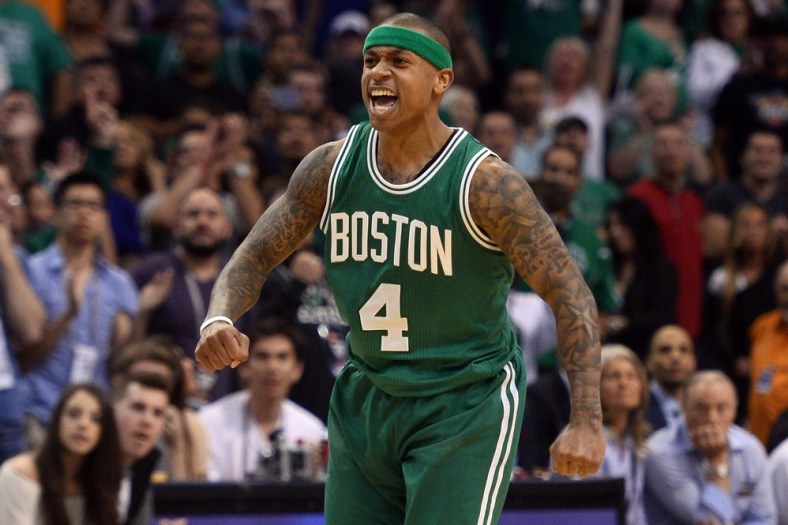
The first round of the NBA playoffs is (almost) over and the second starts Sunday. The big picture has not changed. Cleveland and Golden State are still overwhelming title favorites — neither lost a game in the first round, though the Cavs came close in all four.
Favorites did well during the first round. Depending on what happens in Game 7 between the Los Angeles Clippers and Utah Jazz, a minimum of seven higher seeds (out of eight) advanced to the second round. A few underdogs pushed it to Game 6, and it looked like the Milwaukee Bucks and Chicago Bulls had a chance of pulling off upsets. But both teams fell apart in the end.
In the grand scheme of things, a lack of first round parity might end up a good thing. The Warriors and Cavs should have the toughest path possible and though one could argue Milwaukee would have been a tougher matchup for Cleveland than the Toronto Raptors, the Raptors are undeniably a better team. Cleveland has to go through them and the winner of Wizards/Celtics — a much tougher path than they’ve faced the last two years.
Elsewhere, we’re getting another battle between two MVP candidates and potentially the last dance for two Hall of Famers. Big questions linger for Boston, Washington and Toronto, and even the Warriors are dealing with injuries to Kevin Durant and head coach Steve Kerr. There are no sure things in sports — Golden State’s range of outcomes runs from a 16-0 coronation to a stunning upset brought on by a Durant injury worse than we thought and interim head coach Mike Brown screwing something up.
The second round is where the competition gets real — there are no more 40-win teams that made it by the skin of their teeth. Everyone left earned the right to be here. Let’s get right into the ten storylines that will define the next couple weeks.
1. Can Isaiah Thomas hold up defensively?
In the first round against the Chicago Bulls, Thomas was good enough on the defensive end. Brad Stevens pulled out a bag of tricks to help hide him and the Celtics were helped by an injury to Rajon Rondo, but the bottom line is that Thomas could stay on the floor defensively. He wasn’t entirely himself offensively, but that likely had more to do with the untimely and tragic death of his sister than anything else.
The Washington Wizards are a different animal, though. As good as Rondo was in his two postseason games, let’s not forget that he was a below-average point guard at best during the regular season. The same cannot be said for John Wall. The Celtics will likely opt to start with Thomas guarding Bradley Beal instead of Wall. Beal is less likely to blow by Thomas on drives, but the Wizards will do everything they can to force Thomas into guarding Wall.
Expect to see them run Beal through a thicket of off-ball screens and even use him as a pick and roll screener to try and force Boston to switch Thomas into more unfavorable matchups. Beal was the ball handler in the pick and roll 37 times during the first round, possessions on which the Wizards averaged 1.19 points. If they can’t get Thomas switched onto Wall, Washington may be content to let Beal put him through the pick and roll blender instead.
Thomas may have an easier time containing Beal’s drives, but he can’t go under on a 40.4 percent three-point shooter as he would with Wall. Go over and Beal will drive, forcing the big man containing into a 2-on-1, or worse, lean his body into Thomas and draw one of the fouls which has plagued the playoffs this far. Boston may take the plunge and switch, leaving Thomas on Markieff Morris or Marcin Gortat and relying on help defense.
There are no good options. If Thomas isn’t playing at a high level offensively — he shot just 20 percent from three in the first round — it’s hard to justify playing him. The Wizards will also take advantage of his size to draw crossmatches in transition, where they crushed the Hawks and led all first round teams in total possessions. Stevens can only do so much to hide him if Washington is dedicated to finding him.
2. Can the Wizards’ bench survive?
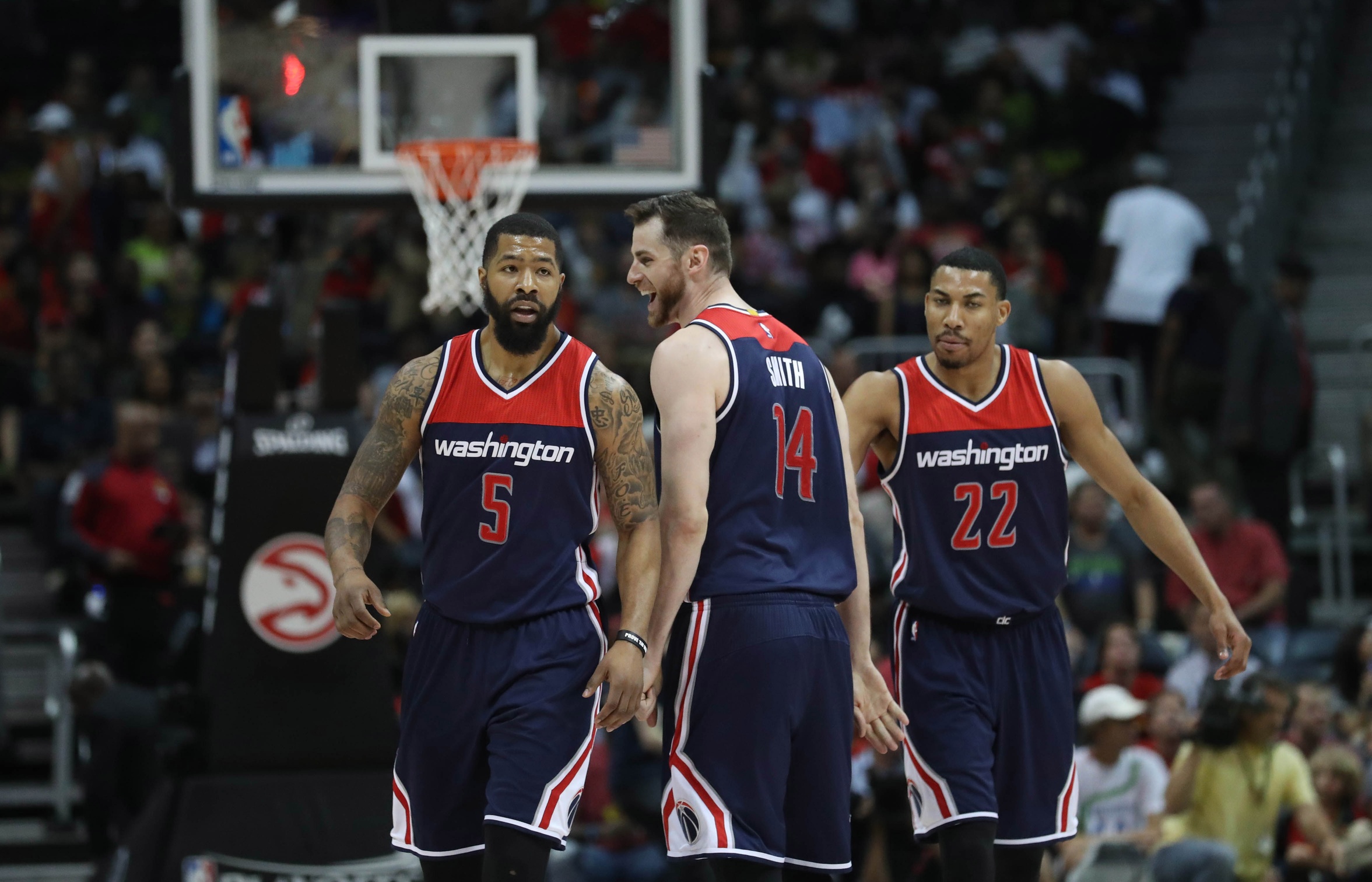
The only reason Washington’s first round series lasted so long was because its bench was miserable. It gave up a 108.9 defensive rating while scoring 98.8 per 100 possessions. Without Wall and Beal on the floor, the Wizards’ offense slips into the dregs of Brandon Jennings ISOs and Jason Smith pump fakes. Make either of those guys defend and the opponent is laughing all the way to the rim.
This won’t get better against the Boston Celtics, who have one of the deeper benches in the playoffs. Marcus Smart is licking his chops at the thought of defending Jennings. Jonas Jerebko might get two or three open threes a game when Kelly Oubre is late on a rotation. Amir Johnson may be the best rebounder on the floor against some units (when was the last time the Celtics had an advantage on the boards?).
The Wizards don’t have to win these minutes, they just have to survive. Head coach Scott Brooks could help by staggering Wall and Beal’s minutes — something he did for some of last series, when there were only 18 minutes with both off court, per NBAWowy.
Brooks also has to find better lineups when Wall is on court without Beal. During those minutes — 39 total in Round 1 — the Wizards barely had an offensive rating over 90 while the Hawks scored 134.6 points per 100 possessions. The Wall-Jennings combo has been in place for most of these minutes and has a -45.0 net rating. Brooks should scrap it.
Defensively, there are some things Brooks can do that can salvage these minutes. Someone can hide on Marcus Smart — preferably Jennings or a big man who can be used as a roamer. Jaylen Brown struggled badly during the first round. If Stevens decides to play him, it could be another hiding place. If Boston uses Olynyk sparingly as a roll man (they did so 2.5 times per game last round), the Wizards can probably live with Jason Smith on him. If Brooks takes advantage of every little thing, he can get Washington’s bench through this series and into the conference finals.
3. Will Kyle Lowry’s playoff woes continue?
In his playoff career, Kyle Lowry is averaging 16 points, 5.1 assists and 4.6 rebounds per 36 minutes on 38.8 percent shooting from the field and 30.6 percent shooting from three. These are significantly worse numbers than his All-Star caliber regular season performances.
That hasn’t gotten better this season. In the first round against the Milwaukee Bucks, Lowry averaged 13.4 points and 4.8 assists, shooting 42.6 percent from the field and 28.1 percent from three. His PER dropped from 22.9 in the regular season to 14.7 against the Bucks.
The Raptors do not have a chance in this series if Lowry isn’t the full version of himself. They need the guy who jacks threes off the dribble after defenders try to duck under a pick and hits them, not the guy who stops the ball, looks around for a pass, can’t find it and forces up a shot.
Toronto barely got by the Bucks. It took a lineup change, Khris Middleton falling apart and Giannis Antetokounmpo dunking instead of shooting a three with three seconds left and the Raptors up three in Game 6. They won’t get that lucky against the Cavaliers. Cleveland was faulty against the Indiana Pacers but remains overwhelming favorites. The Cavs won’t beat themselves.
Lowry has to be the best point guard in the series, if not the best player. He has to outplay Kyrie Irving on both ends of the floor. That’s not impossible.
Lowry was better than Irving during the regular season and was arguably the best point guard in the Eastern Conference. He finished the regular season in the 95th percentile as a pick and roll ball handler, averaging 1.05 points per possession. That number plummeted to 0.83 in the first round — the 42nd percentile.
Where it ends up over the next seven games will be the biggest indicator of Toronto’s success. If it can’t get Lowry going in a place where he thrived during the regular season, it has no shot of beating Cleveland.
4. Do the Raptors stay small?
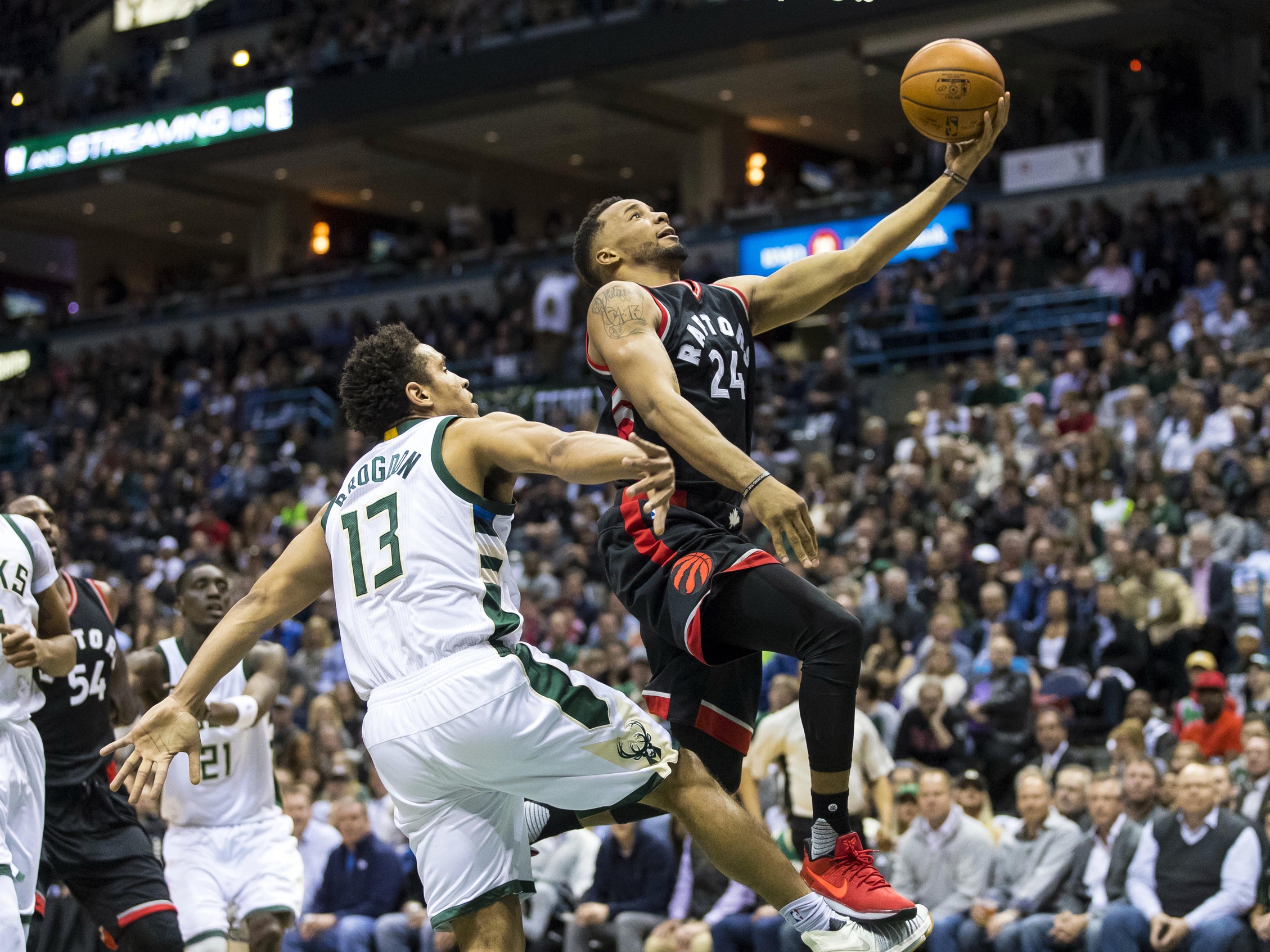
Putting Norman Powell in the starting lineup changed the series against Milwaukee. It forced Thon Maker to guard Serge Ibaka on the perimeter, taking away Milwaukee’s best rim protector. It also gave Powell minutes with to play good defense and go bananas from the field, shooting 10-of-11 from three and 55.6 percent total. Powell will undoubtedly get minutes regardless, but whether he stays in the starting lineup is a different question because the Cleveland Cavaliers are a different matchup.
Unlike Milwaukee, the Cavs won’t stifle Toronto with length. Having Powell in will take Tristan Thompson away from the rim, but Thompson can defend well on the perimeter. Without Jonas Valanciunas, the Cavs will also have the best two rebounders on the floor in Thompson and Kevin Love. That leads to more transition opportunities for Cleveland as well as second chances on the offensive end.
With that in mind, Raptors head coach Dwane Casey may start the series with Valanciunas back in the starting lineup, but there’s a good argument for Powell as well. His presence fundamentally changed Toronto in Round 1 — the Raptors had a +19.5 net rating with him on the floor, the best among rotation players by nearly 15 points.
And while Thompson may be comfortable on the perimeter, Kevin Love is not. Start Powell and Love has to guard Serge Ibaka, with Thompson pressing his luck against a wing player — probably Powell. Thompson does better than most bigs when switched onto perimeter guys, but it’s a mismatch nonetheless. Love will struggle if the Raptors can force a switch and may have trouble containing Ibaka regardless.
There’s also the simple notion of sticking with what works. The Raptors won every game Powell started. Sometimes, the answer is as easy as that. There isn’t any margin for error here. Toronto has to get everything right to win this series — mistakes from Casey won’t fly. He shouldn’t overthink it. Powell should be in the lineup.
5. Can the Cavaliers be challenged in the East?
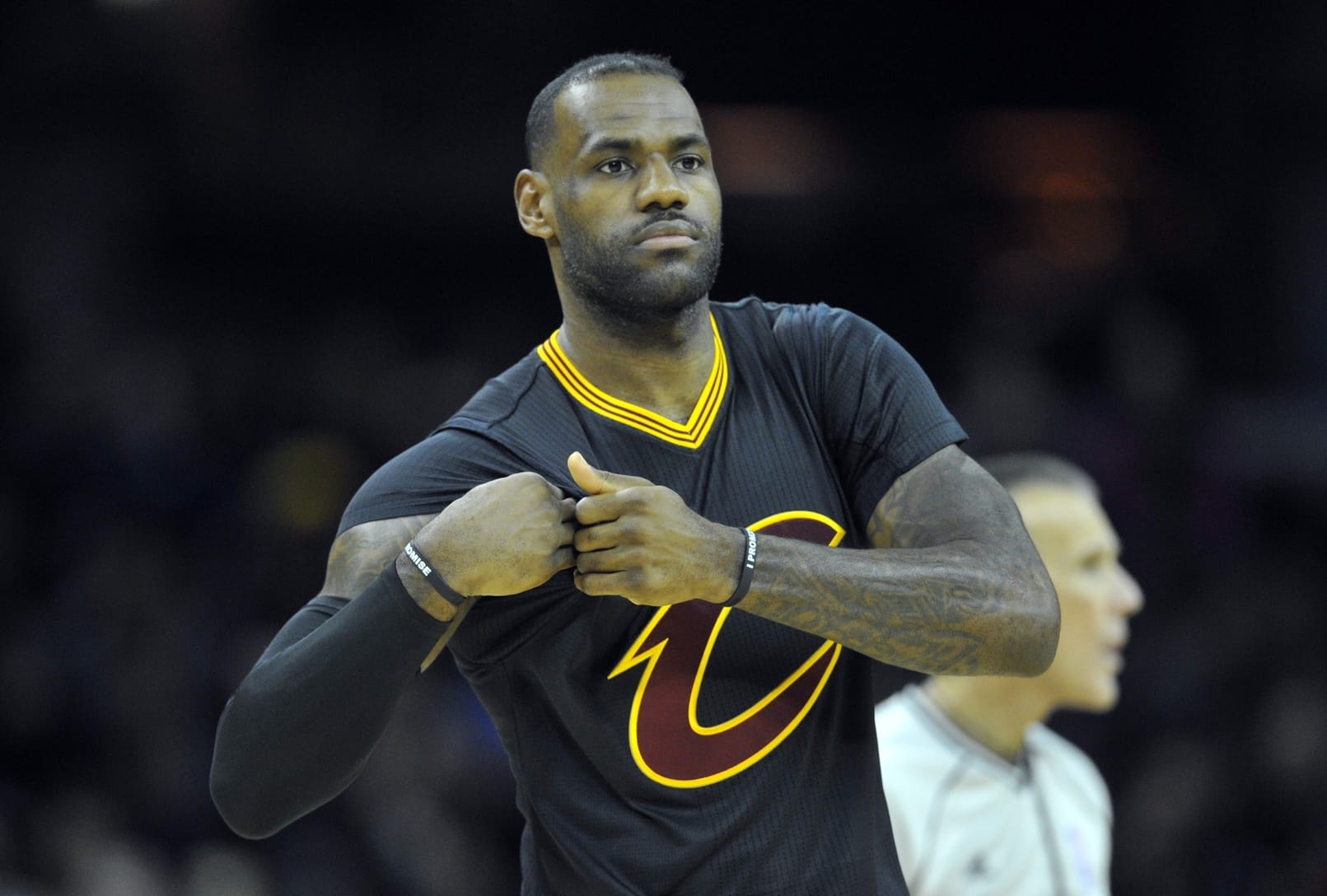
In the first round, the Cavs had the least-convincing four-game sweep of all-time, getting bailed out by bad late-game decision making on the part of the Indiana Pacers more than once. Even after it seemed like they flipped the proverbial switch in Game 3, coming back from a massive deficit to win, they struggled to put the Pacers away in Game 4.
The Raptors are as tough a matchup as Cleveland will have. Washington or Boston probably have a similar chance of beating them, but if Toronto gets blown away then that chance is pretty small. LeBron James has made the Finals six years in a row — something nobody has done since Bill Russell’s Celtics, not even Michael Jordan. At this point, it feels like an annual occurrence.
But the East is tougher this season. For most of his reign, or at least the past three seasons, James has benefited from having a monopoly by default. Nobody has given his teams a challenge since the 2013 Pacers took them to Game 7, but nobody has ever gotten to that moment and come close to succeeding. The 2013 Pacers lost Game 7 by 23 points. The 2012 Celtics were up 3-2 over the Heat, then lost by 19 at home in Game 6 and 13 in Game 7.
Nobody has come as close to knocking LeBron off the throne than Rob Stark did to knocking Joffrey Baratheon off his, and we know how that ended.
But this year feels different. The East is deeper. Cleveland faces legitimate opponents this round and will next round, whomever wins. Something has to give, and we’ll see the first indications of whether it will at the beginning of this series. Will this be competitive for real or like last year’s conference finals when Cleveland toyed with the Raptors and lost two games but never ceded control of the series? If we’re being honest, probably the latter.
6. Kawhi Leonard vs. James Harden
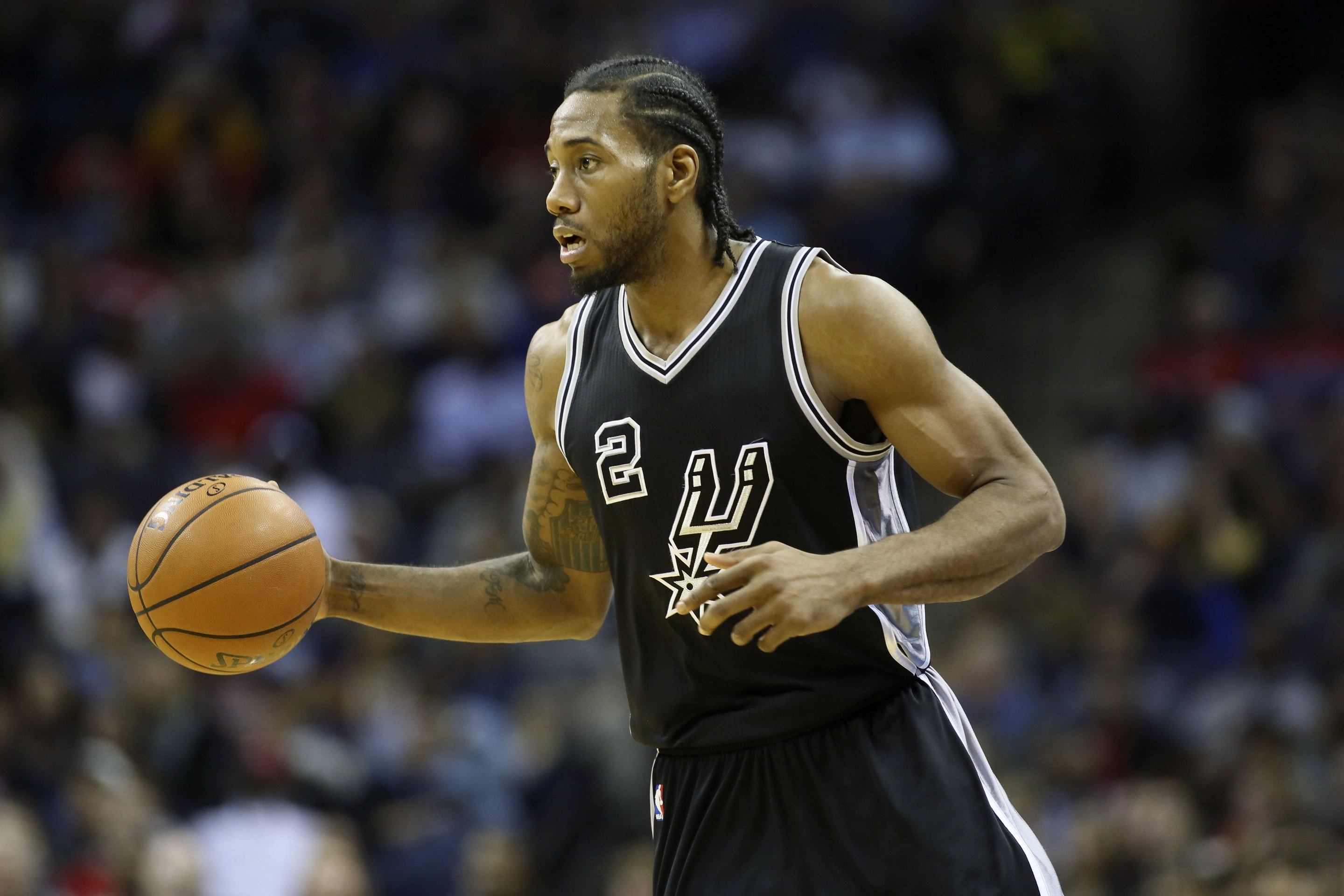
James Harden dispatched of one MVP candidate, Russell Wesbrook, in the first round and now faces off against another in Kawhi Leonard. The two won’t guard each other, except on the occasional switch, but the series is still all about them.
Leonard carried the Spurs, almost singlehandedly, to victory against the Memphis Grizzlies. The onus will be on him again to play great defense and carry the load offensively. Leonard had a 31.5-percent usage rate in the first round and don’t be shocked if the number gets higher with more close games in this round.
Harden has less to do than Leonard. His supporting cast is significantly better — a key argument in the MVP debate — and the Rockets will do all they can to hide him defensively. Yet, despite a similar dynamic in the first round, Harden still threw up 33.2 points, 7.0 assists and 6.4 rebounds per game. Everything the Rockets do offensively goes through him, be it the pick and roll or the nearly eight isolations per game they gave Harden during the first round.
Even if the two won’t match up with each other, they’ll be more or less alternating possessions at the end of games. The Spurs are happy to put Leonard on the block and let him work — Leonard scored 1.56(!) points per possession on nine first round post-ups. And though he struggled in isolation during the series, he averaged 0.94 points per possession during the regular season — a good number given the general inefficiency of isolating.
The Rockets may be less likely to ISO Harden, though they did so a lot during the first round. But they’ll try to pick and roll the Spurs to death. Of Harden’s 33.2 points per game during the first round, 17.8 came as the ball handler in the pick and roll, a play out of which he scored 1.11 points per possession.
In clutch situations during the first round, Harden had a 59.8 usage rate. Leonard had a 53.4 usage rate. To say the series will come down to who outduels the other could be an understatement.
7. Can the Spurs survive defensively?
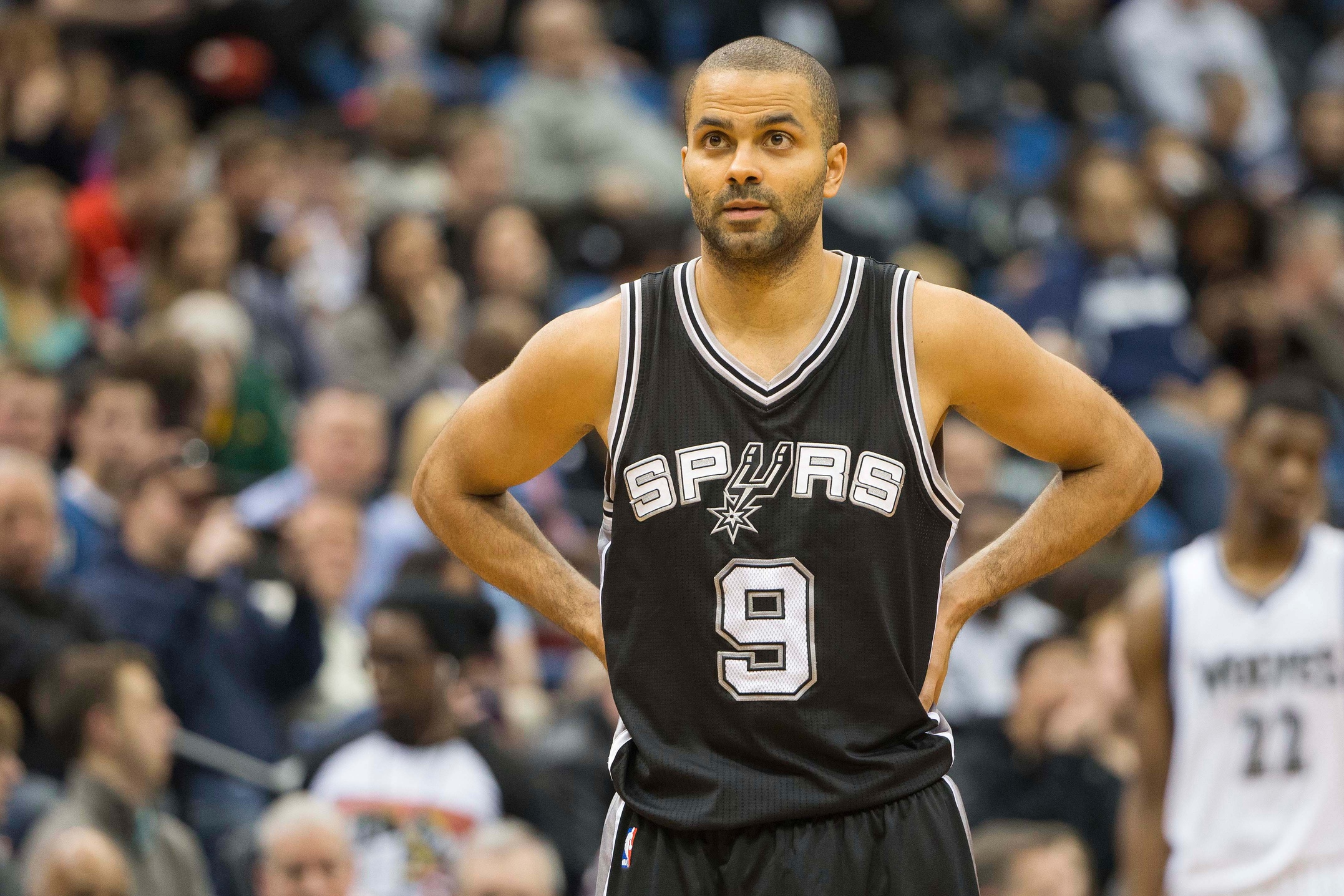
This is a weird question to ask about a team that finished first in defensive rating during the regular season. But the Spurs gave up a 107.3 defensive rating in the first round, which would have ranked 21st over the regular season. Why?
Tony Parker, Manu Ginobili, Pau Gasol and David Lee are all massive defensive liabilities. They’re older, slower, clunkier and in the postseason they get targeted in the pick and roll or in isolation. LaMarcus Aldridge isn’t quite as bad, but he’s never been a particularly strong defender. The Spurs survived in the regular season thanks to great coaching and Kawhi Leonard, but they also benefited because teams don’t hunt bad defenders in the regular season the same way they do in the postseason.
That changed in the first round, and it will only get worse in the second. Leonard can do a lot, but defense is a five-man game. Teams such as the Rockets will be content to station Leonard’s man in the corner and go 4-on-4. With a team like Houston, Leonard’s man — likely Trevor Ariza — will be a good enough shooter to make Leonard pay for helping. Teams did that with success during the regular season, so expect to see it more in this series.
If Leonard is taken out of the equation, the Spurs will have a lot of trouble defensively. Houston may try to put Leonard on an island, but Gregg Popovich could counter by having him guard Houston’s bigs — screeners in the pick and roll — or even Harden himself. Certainly that would be the most fun option, and though it won’t be Pop’s first choice, the Spurs may have to resort to it if Houston’s offense gets off to a strong start.
8. Could Tony Parker and Manu Ginobili retire if the Spurs lose?
Neither have said anything on the topic, but one imagines that Parker, age 34, and Ginobili, age 39, are thinking long and hard about retirement. The two are the last bastion of the Tim Duncan/David Robinson era — Ginobili’s first year, 2002-03, was Robinson’s last. After Duncan’s retirement last season, it seems only logical that Parker and Ginobili will follow.
Especially if the Rockets go up, this will hang over the series. And it should. Both Parker and Ginobili are Hall of Famers and four-time champs. Without them, there is no dynasty in San Antonio — the Spurs are just another small-market team like the Kings, Grizzlies or Hornets.
These two symbolize the Spurs’ sustained success and so much within that, including the ability of small-market teams to succeed in general. So much focus gets put on how hard it is for small markets to sustain success, especially after Kevin Durant left Oklahoma City, but the Spurs have done it for 20 years. They’ve built a culture of winning, in large part around Ginobili and Parker. Not only that, but that culture has trickled down to younger players like Kawhi Leonard.
Ginobili and Parker have exemplified the selflesness and winning attitude that has defined the Spurs for 20 years. Let’s keep that in mind and appreciate what could be their last couple weeks in the NBA.
9. Is Kevin Durant healthy?
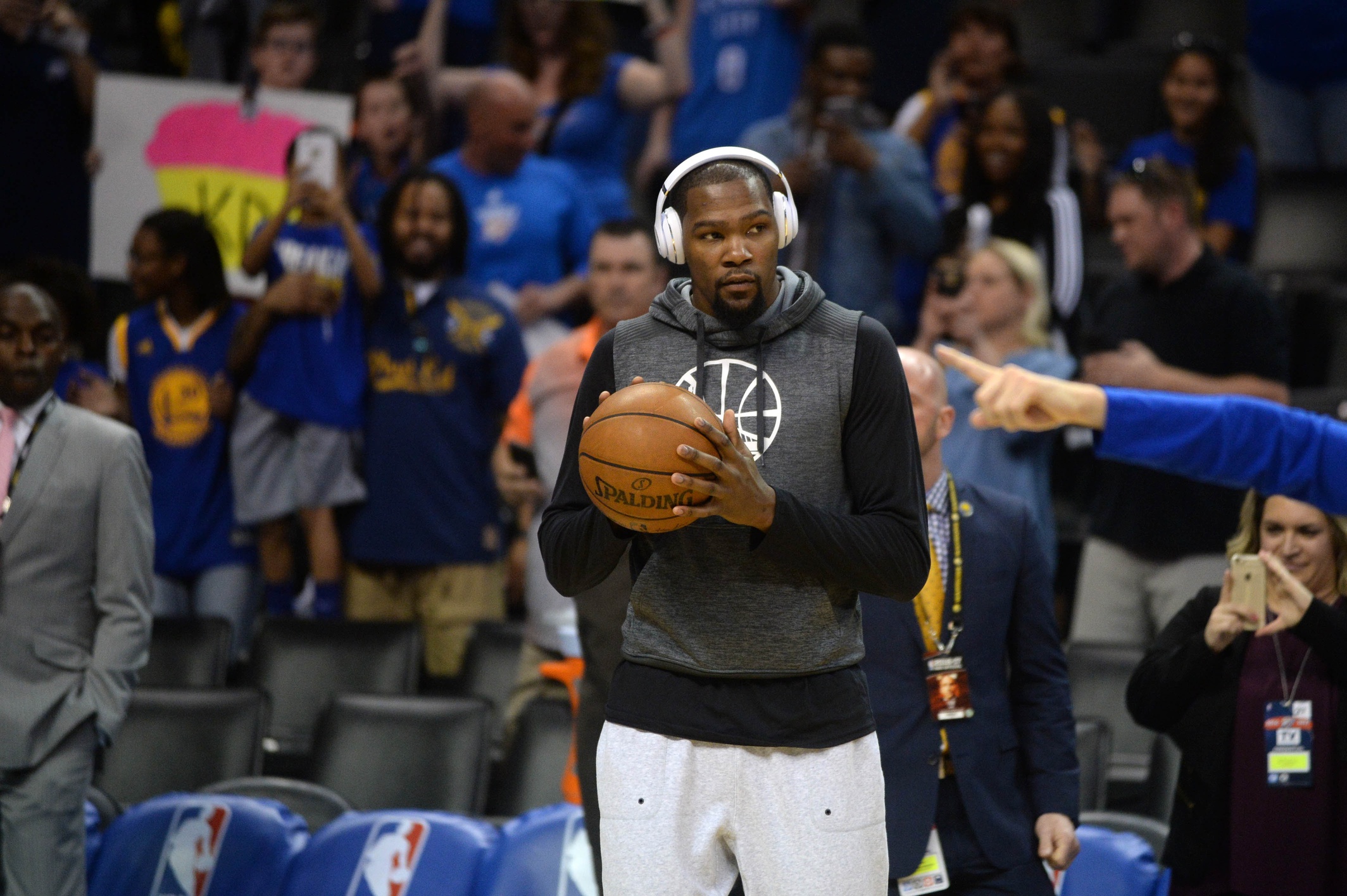
Though Durant played just two games in the Warriors’ first round series, it seemed as though he would have played had it been a Game 7. His calf issue, however, is lingering. The Warriors will struggle to survive against the Clippers or Jazz if he isn’t a full go.
Their time off — over a week — could prove to be all Durant needs to get fully healthy. But if it isn’t, that could indicate the injury is worse than anyone has let on. The Warriors have a chance to go undefeated in the postseason if everyone is healthy, but the margin of error is razor-thin. If Durant is missing time — or even if he’s playing at 50 percent, the Warriors could suffer an embarrassing upset.
They’ve played well without Durant during the regular season, but this is a different animal. Part of the appeal of signing Durant was that an injury to one of their superstars wouldn’t upend their title hopes and if the worst-case scenario happens, their title hopes won’t be upended. However, they will be greatly diminished.
Durant isn’t just 27.8 percent of Golden State’s offense by usage rate, their best scorer and a great defender. He’s also the reason opponents can’t use the same strategy Cleveland did in last year’s Finals and switch everything to force the Warriors into ISO-ball. Durant is too good in isolation, and particularly against switches, for that to work. Teams may not beat Golden State if he isn’t healthy, but there’s a way of doing so — much more than you could say otherwise.
10. What changes for the Warriors with Mike Brown on the bench instead of Steve Kerr?
Mike Brown probably has no intentions to change Golden State’s system, their offense, their culture or anything close to that big. He doesn’t know how long he’ll be filling in for Kerr, and there wouldn’t be any point in changing anything if Kerr retired tomorrow because everything Kerr has done has worked to perfection. But that doesn’t mean everything will stay the same.
Take Luke Walton’s stint last season as an example. Nothing major changed, but Draymond Green took 11.0 shots and 3.6 3-pointers per game during Walton’s stint, a testament to his non-assertive style. When Kerr came back, Green’s numbers immediately dipped — he averaged 9.1 FGA per game and 2.7 3-point attempts for the rest of the season because Kerr told him to stop shooting (This led to Green blowing up at Kerr in a game at Oklahoma City, screaming “I am not a robot!”).
Little things such as that could change under Brown, as could the way Golden State handles the clock and substitutions late in the game. Brown didn’t have a good reputation for game management in his previous gigs. Has that changed since he’s been learning under Kerr? Since the entire Portland series was blowouts, we don’t know yet.
Hopefully, Kerr gets healthy and Brown won’t be in place for long. But nobody — including Kerr himself — knows whether he’ll be back in a week or in a year. Right now, we have to work under the assumption that Brown will be the head coach for the foreseeable future, meaning that he will have a tangible effect on the success of the Golden State Warriors. Just what that effect is, we’ll have to wait and see.
BONUS: Will Sunday be Paul Pierce’s last game?
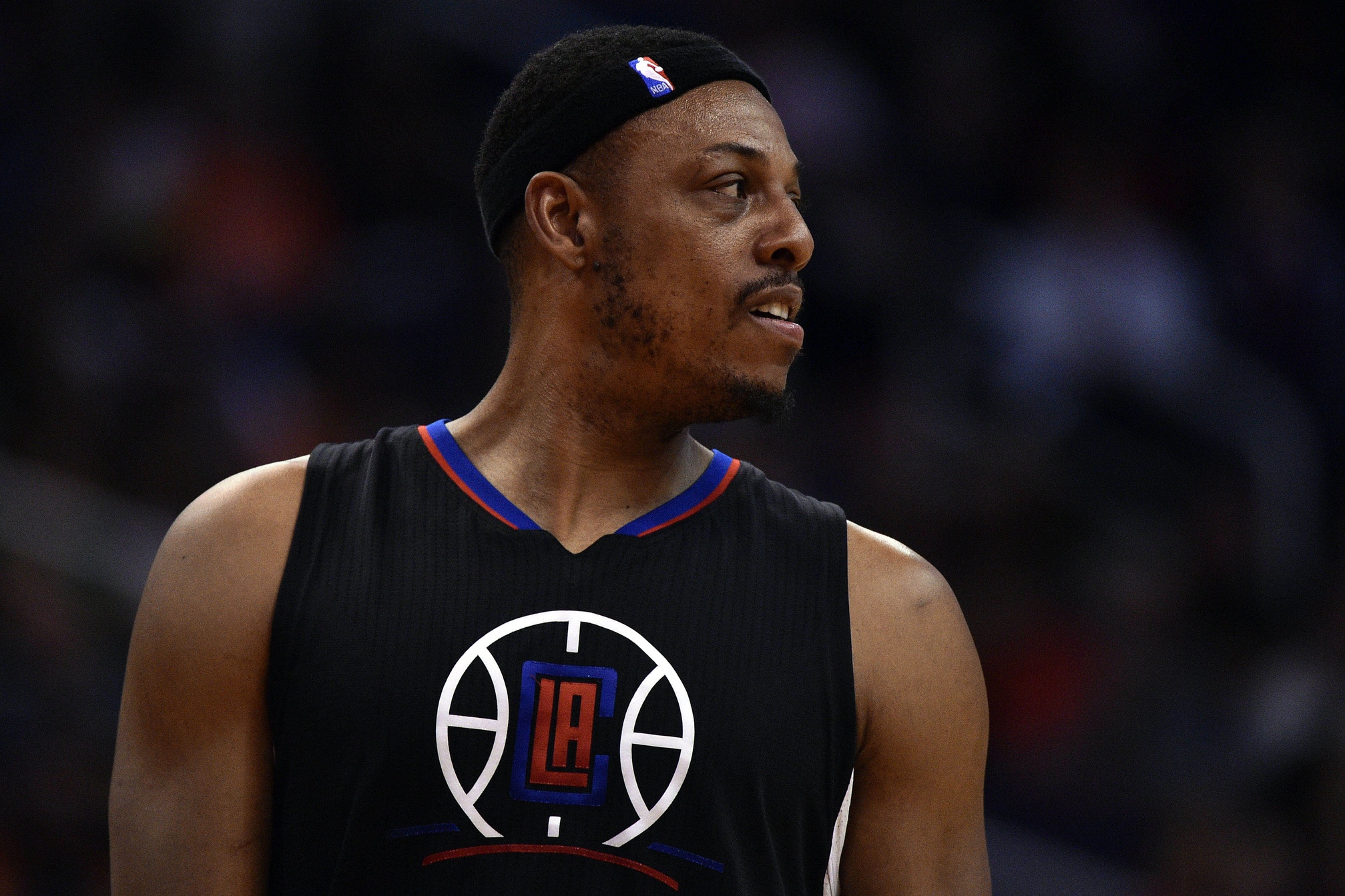
Los Angeles Clippers’ forward Paul Pierce is retiring after the season, and as the team stares down a Game 7 against the Utah Jazz, let’s take some time to appreciate Pierce in case this is the end.
Pierce is going to be a Hall of Famer. He’s a 10-time All-Star, 2008 Finals MVP and four-time All-NBA team member. He’ll end his career averaging 19.7 points, 5.6 assists and 3.5 rebounds per game. But if you take out the last five seasons when he’s been washed up, those numbers shoot up to 22 points, six rebounds and 3.8 assists. He’s fourth all-time in three-point field goals and top-50 in games, minutes, field goals, free throws, defensive rebounds, steals, VORP and win shares.
In the postseason, Pierce never shied away from the moment. In Game 3 of the 2002 Eastern Conference Finals, he helped lead a 21-point fourth quarter comeback against the New Jersey Nets. He scored 41 points in Game 7 of the 2008 Eastern Conference Semifinals to help the Celtics beat the Cleveland Cavaliers and came off a wheelchair to lead a Celtics comeback in Game 1 of the ’08 Finals, winning MVP of that series. Even in his washed-up phase, Pierce was hitting postseason game-winners for the Brooklyn Nets and Washington Wizards.
If Sunday is the end, then it was a fun ride, even for this Lakers fan.